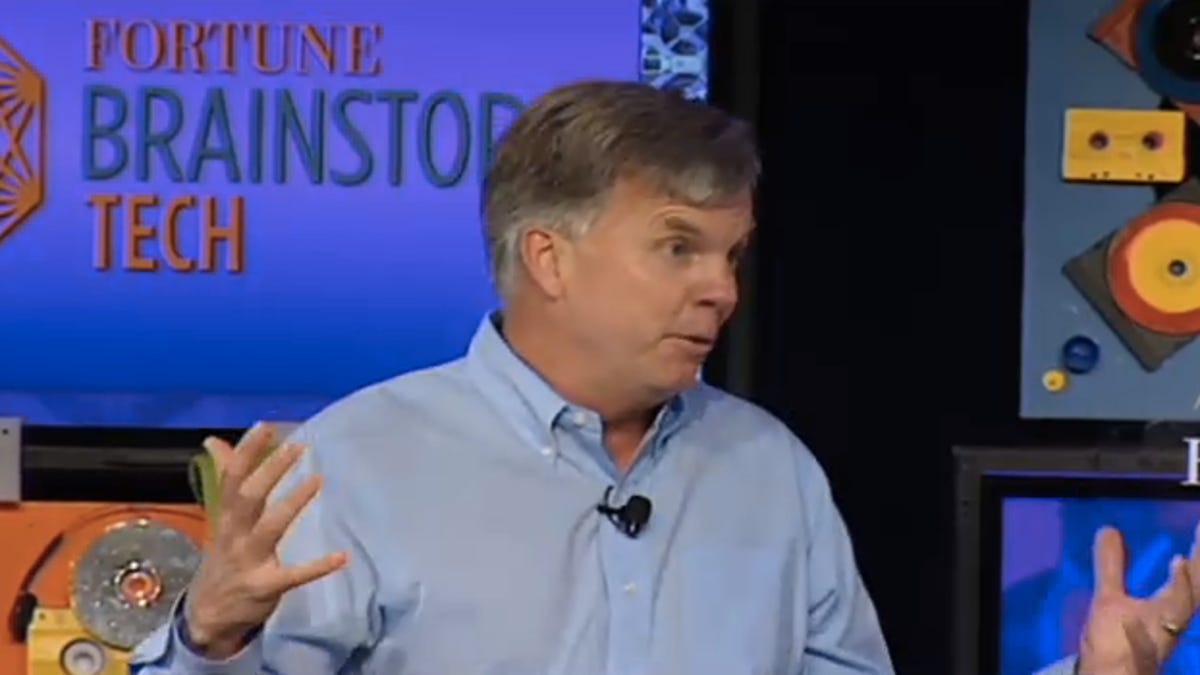Former Apple retail chief seeks to 'bear hug middle America'
Former Apple Retail Chief and current JCPenney CEO Ron Johnson says it's too early to call brick-and-mortar retail shopping a dinosaur.

JCPenney Chief Executive and former Apple Retail Chief Ron Johnson says physical retail's best days are still ahead of it and that online shopping won't keep growing forever.
In an interview at Fortune's Brainstorm Tech conference in Aspen, Colo., the executive said online retail will "level out," giving physical retail stores an opportunity to offer things to shoppers that can't be had through a digital screen.
In remaking JCPenney in the Apple retail store image, Johnson said he's treating the more than 1,100 stores like a startup and that he expects losses as he implements the new strategy. Following his strategy of ditching sales events in favor of fixed pricing, first-quarter sales fell 18.9 percent. But Johnson said he and the board are sticking to the plan.
"Stores have been designed to pick something up. They're transactional, they're not experiential," Johnson said, adding that part of what has made Apple's retail stores so successful is the overall experience customers have. "The store has to offer so much more. It harkens back to what it was like a hundred years ago: it's the products and the experience."
Johnson and the JCPenney retail empire have been under close watch since the former Apple exec took the company's helm late last year. Upon joining the company -- which mainly sells clothing -- Johnson not only implemented the radical fixed-pricing strategy but also began to take a page or two from the same playbook used in Apple's stores, including things like free Wi-Fi and self-checkout from smartphones.
In an interview with Fortune editor Jennifer Reingold, Johnson said the next step in that high-tech effort is to make use of radio-frequency identification, or RFID, in each and every store. The first part of that is applying RFID tags in the tags of all the company's merchandise by this fall, with the end goal of having a cash register-free store by the end of next year.
"About 10 percent of all the money we spend goes to transactions. That could be done through technology," Johnson said.In other words, Johnson sees a future where you don't line up somewhere to buy your item once you're ready to check out. You just do it yourself, and leave. The money saved there could then be used to put the money into the service and experience when you're picking something out, he said.
"We will put a big bear hug around middle America, and take them to a place they never thought they could get to," Johnson said. "Middle America appreciates great design."
"If you put the customer first, you don't care where they buy, but you do care that they buy. You can't put pressure on them...you have to look into their heart, not their pocketbook," he added.
Johnson said RFID is technology that's been "waiting for prime time," based on its cost. The sensor technology has the potential to improve the accuracy of how stores track and report their inventory. That's especially important as retail stores try to more deeply integrate online-friendly components like in-store pick up.
After more than a decade building Apple's retail ambitions into an empire, Johnson left for JCPenney last June. Under Johnson's direction, Apple's stores became a major success, helping to fuel record sales and act as service stations for the company's growing product line. Johnson is credited both with the strategy of the stores, as well as much of the micromanaging that goes into the details, from materials used all the way to the layout of each store.
Reminiscing on some of his time there, Johnson noted that when the company was first hiring for its Genius Bar, the two main credentials were that applicants could go toe-to-toe with late Apple co-founder Steve Jobs when it came to technology, and that they have customer service skills that would get them a job at the Ritz Carleton. Johnson said he intends to bring some of those same requirements to staffing up the company's 100 in-store specialty stores, including a "denim bar" that will sell Levi's jeans at about 700 JCPenney locations.

